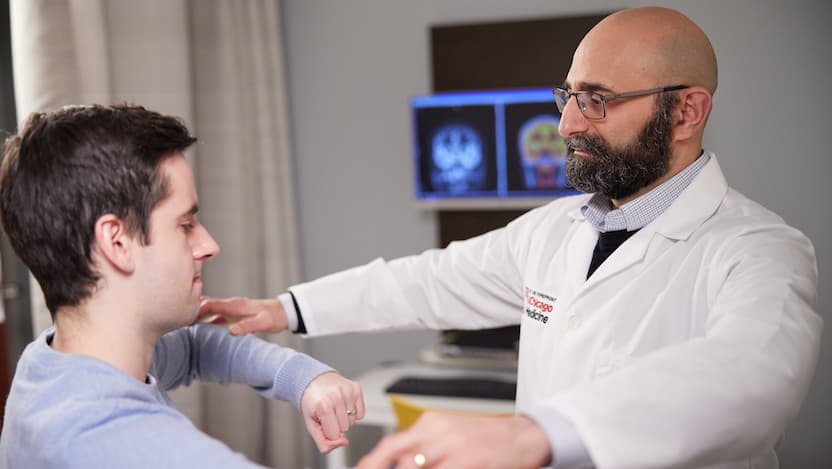Why an experienced epilepsy team matters

Epilepsy is a brain disorder that causes seizures — abnormal, rhythmic activity in the brain. Seizures can be expressed in various ways, including staring spells, convulsions or a sense of déjà vu, which is a feeling that you’ve already experienced something that is happening for the first time.
It’s important to work with experienced physicians to properly diagnose and treat epilepsy. The University of Chicago Medicine has a dedicated epilepsy monitoring unit (EMU) at several of its locations to conduct more in-depth, inpatient studies to find answers.
In this Q&A, UChicago Medicine neurologist and epilepsy expert Naoum Issa, MD, PhD, discusses how epilepsy is diagnosed and what treatments are being used to get patients back to living seizure-free.
What's going on in the brain during a seizure?
Electrical activity in your brain is normal. However, a seizure happens when there is a significant disruption of normal electrical activity in the brain. Your brain stops being able to do what it usually does for about 2 to 3 minutes and instead drives this abnormal electrical activity.
Epilepsy seizures commonly fall into two main types:
- Focal-onset seizures: They originate in one area of the brain, such as the temporal lobe behind the eye. These seizures can spread from the starting point to take over both sides of the brain. Focal-onset seizures are more common in adults.
- Generalized-onset seizures: These seizures affect both sides of the brain simultaneously, without warning. Epilepsy with generalized-onset seizures tends to begin in childhood.
What causes epilepsy?
The exact mechanisms underlying seizures are complex and can vary. Factors that can contribute to seizures include genetics, brain abnormalities, head injuries, infections and metabolic imbalances.
How is epilepsy diagnosed?
If you are experiencing multiple seizures with a repeated pattern, your doctor will refer you to a neurologist who specializes in treating epilepsy. UChicago Medicine has two nationally-classified Level 4 epilepsy centers — one for adults and one for children. Level 4 is the highest possible classification granted by the National Association of Epilepsy Centers.
In most cases, your provider will know if you are likely to have epilepsy by hearing the history of your episodes. Your doctor will also perform a physical exam, and additional diagnostic tests may be needed. These diagnostic tests for epilepsy include:
Electroencephalogram (EEG)
An EEG measures your brain’s electrical activity as a series of squiggles called traces. Each trace corresponds to a different region in your brain. Certain abnormal patterns, such as spiking and sharp wave activities on an EEG, can help support or confirm a diagnosis of epilepsy.
There are two kinds of outpatient EEG tests: a test performed in the clinic and an ambulatory test performed at home. Both are safe and painless.
Epilepsy Monitoring Unit (EMU)
If your physician can’t get a clear diagnosis from an EEG test, you may need to visit one of UChicago Medicine’s Epilepsy Monitoring Units (EMU). There, you'll undergo an inpatient evaluation that allows your provider to monitor seizures or other brain events over five days while you are connected to a continuous video EEG.
In this controlled environment, your doctor may adjust your medication dosage or use different strategies, such as flashing lights or sleep deprivation, to trigger a seizure. Our dedicated EMU team will provide 24/7 monitoring throughout the evaluation.
How is epilepsy treated?
The good news is that most people with epilepsy—up to 70%—can prevent seizures with medication.
Treatment options for epilepsy include anti-seizure medications, lifestyle modifications and surgery. In many cases, if you can identify and treat the cause of epilepsy, you can successfully manage it.
Anti-seizure medications: The most common treatment for epilepsy is with medications known as anti-seizure medications. These drugs help control or reduce the frequency and intensity of seizures. There are many different medications available, including new medications developed in the last decade. The choice of medication depends on the type of seizures, your age, gender, overall health and any potential side effects. It can take some time to find the right medication for you.
Surgery: In 30% of cases where medications fail to control seizures, surgery may be the best option to control seizures. There are a variety of types of surgery, most of which are used to treat patients with focal seizures in a specific area of the brain.
Because of recent advances in surgical options, including minimally invasive, image-guided laser surgery, we can now offer surgery to many patients who were not previously considered candidates for surgery.
Ketogenic diet: In some cases, a ketogenic diet, which is high in fats and low in carbohydrates, can reduce and even eliminate seizures—particularly in children.

Naoum P. Issa, MD, PhD
Naoum Issa, MD, PhD, is a neurologist specializing in the treatment of epilepsy. He works closely with patients to control their seizures and is passionate about offering advanced options for epilepsy that is resistant to anti-seizure medications.
Read Dr. Issa's physician bio